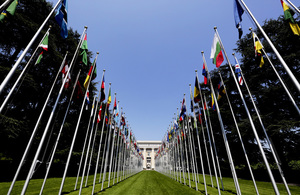Thank you Chair.
I am honoured to deliver this statement on behalf of Japan, Israel, Australia, New Zealand, Norway, the EU and its Member States, South Africa, Monaco, the United States, the Philippines, Canada, Montenegro, Rwanda, Switzerland, Thailand, Albania, Singapore, Mexico, Costa Rica, Peru, Republic of Korea, Fiji, Indonesia, Ecuador and my own country, the United Kingdom
We welcome the progress made by WHO in tackling sexual exploitation and abuse and sexual harassment, primarily in the latter part of 2021. We commend your efforts and welcome the acknowledgement that there is still much more to be done: there are collective challenges we need to address, risks we must manage and lessons we must all learn. We welcome the constructive dialogues at the governing bodies meetings, and hope to see sustained senior management engagement on this matter, to strengthen WHO’s approach and ensure zero tolerance for inaction.
Chair,
We fully endorse the five priority areas identified by the IOAC Sub-Committee in their report to this Executive Board. We ask that they be integrated into the SEAH Workplan and the IEOAC matrix for monitoring their implementation.
The scale of WHO’s work in humanitarian contexts has grown rapidly in recent years. While the specific risks of working in these contexts are well known, WHO’s capacity to manage them effectively has not kept pace. The SEAH Workplan must accelerate the expansion of WHO’s workforce and capacity-building to address these challenges, including for the design and implementation of effective complaints mechanisms, cooperation with trusted implementing partners, and for addressing gender imbalance in emergency operations.
Chair,
A victim- and survivor-centred approach must be the ultimate guide for WHO’s work on SEAH. Support to victims and survivors must be tailored and sustained; complaints must be promptly, safely and appropriately addressed; and perpetrators must be held to account. WHO should ensure it has sufficient capacity at all levels, focused on preventing SEAH; processing and investigating reports; and supporting victims and survivors.
An investigative system that promotes transparency while also guaranteeing adequate due process for subjects of concern is essential to building trust and integrity in WHO’s processes. We request regular updates, including at governing bodies, on the processes WHO is putting in place, including the package of support offered to victims and survivors.
WHO must ensure and promote a safe, equal and inclusive working environment for all its personnel. With this in mind, action on sexual exploitation and abuse, and sexual harassment, must be aligned, since all are rooted in the same power imbalances and gender inequalities that give rise to unacceptable behaviour across the spectrum of sexual misconduct and crimes. Both deeply undermine the important work being carried out by WHO, and must be addressed both in its work in communities as well as within the Organisation itself.
We would welcome regular updates from WHO, including to the governing bodies, on actions being taken to bring SEA and SH policies together, in line with the 2019 DAC Recommendation.
Finally, current efforts to engage in SEAH inter-agency initiatives are encouraging. We expect to see ever-stronger inter-agency collaboration, in line with United Nations Development System Reform, and working alongside the Office of the Victims’ Rights Advocate and the Office of the Special Coordinator on Preventing SEA.
We hope this will help to ensure UN and international health agencies learn from each other on an ongoing basis, and bring greater consistency across agencies in performance measurement of their leaders for improved safeguarding against SEAH.
It is in everyone’s interest that all WHO personnel act with utmost integrity both among colleagues and in the communities they serve. Safeguarding against sexual exploitation and abuse and sexual harassment is everyone’s responsibility.
Thank you Chair.

